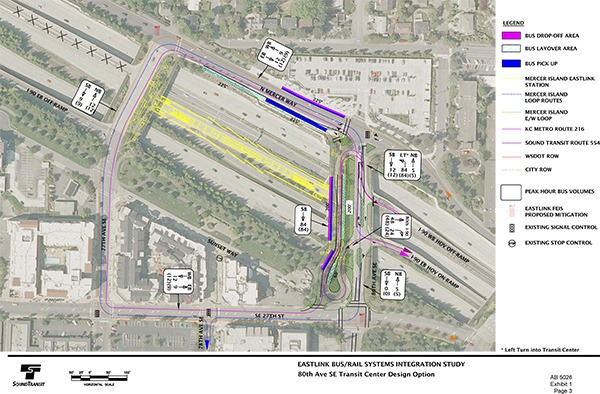At its March 30 meeting, the City Council discussed how Mercer Island will move forward with Sound Transit and King County Metro on I-90 transit integration.
A memo regarding negotiations with Sound Transit on commuter parking, a dollar amount for loss of mobility mitigation and a bus intercept proposal was sent out hours before the meeting started.
Many Islanders were concerned about the late notice, and the bus intercept.
As part of the East Link project, Sound Transit and Metro have been exploring the possibility of turning around buses at the future Mercer Island and South Bellevue light rail stations to eliminate redundant service across the I-90 bridge into downtown Seattle.
The East Link “baseline,” which sets the scope, budget and schedule for the project, is set to be adopted April 23. The baseline includes plans to turn buses traveling on I-90 around in Mercer Island, and a similar plan for those on I-405 in South Bellevue, said Bruce Gray, Sound Transit public information officer.
Currently, 33 buses stop on Mercer Island during peak hours, and with the bus intercept, that number may go up to 45.
“The benefit is that we reduce service time and provide savings in service hours for Metro to allocate elsewhere,” said Tia Raamot, Sound Transit project manager for Eastlink.
Sound Transit presented a report to Mercer Island in July showing four possible routes for a bus turnaround, with a few routes going through the Town Center. Since then, a plan has developed to use 80th Avenue S.E., at the east-end of the planned light rail station. It’s “the same idea, just compressed,” Raamot said.
“This all started because city leaders didn’t want 45 buses doing a loop through downtown,” she said. “We wanted to find a solution that had the least amount of impact on the Island.”
80th Avenue wasn’t considered originally because “the length of the two lanes could only accommodate up to three articulated buses each,” according to the 2014 report. That was a conservative estimate, Raamot said, and engineers have since revisited the geometry.
Two months ago, Metro did a live test with 10 buses to make sure they could turn around in the allocated space.
Still, city officials say that no bus intercept can be approved until additional resident-only commuter parking is included in the proposal.
Many other communities face similar problems with their Park and Rides filling before 7:30 a.m. and with people who aren’t residents parking there.
Mercer Island officials have ideas for permit or distance-based pricing programs to be piloted at their Park and Ride. Raamot said that is “something we will pursue.”
Raamot said Sound Transit is also “still exploring” the option to use $6.3 million to enter into a parking partnership with Mercer Island. That amount of money is not for “mitigation,” she said.
Mayor Bruce Bassett and fellow transportation subcommittee members Deputy Mayor Dan Grausz and Councilmember Debbie Bertlin had a meeting with Sound Transit representatives on April 2.
“The demand for access to I-90 transit is going to grow, especially with light rail,” Bertlin said. “Everything is on the table at this point, and no decisions have been made. We have respective interests that can be mutually addressed with creative thinking.”
Councilmembers Mike Cero and Benson Wong expressed frustration on March 30 that none of the agreements or negotiations have been put in writing.
“We’ve gone from written contracts to unwritten narratives,” Cero said.
The $6.3 million won’t cover the cost of providing 200 parking stalls, according to the city’s memo.
Hines, a developer planning a new project in Town Center, expressed interest in working with the city to provide a floor of underground parking, but says it will cost $10-12 million.
“Neither Sound Transit staff nor Sound Transit Board members have expressed enthusiasm for the higher number nor did they rule it out,” the memo states.
The city has also asked Sound Transit to add bus capacity for Island commuters and consider a shuttle service from the South-end so Islanders can take advantage of I-90 transit without having to find parking at the North-end.
“We have to move beyond Sound Transit’s historic approach to park and rides,” Bertlin said. “We could look for community partnerships and show how Mercer Island could be a pilot for other communities.”
Residents have other concerns, such as where the sculpture on 80th Avenue would be moved, and that there is no “kiss and ride” or temporary drop-off zone by the bus intercept.
Raamot said the drop-off area will be on 77th Avenue S.E., at the west-end of the station, which is the designated Mercer Island local entrance.
Raamot said that Sound Transit has no current plans to host an open house, but that the agency will work with Mercer Island on a public outreach program. A public comment form on bus-rail integration is available on the city website.
Update: City Manager Noel Treat sent a letter to Sound Transit on March 18 emphasizing that the city won’t approve the Bus Intercept proposal without a solution to its commuter parking problem.
“From our standpoint, the 2004 Amendment to the 1976 Memorandum of Agreement, with its requirement that the loss of mobility from the closure of the center roadway be addressed, is sufficient legal basis by itself for what is being requested,” he wrote. “Further legal support can be found from the fact that the Bus Intercept proposal was never part of the original East Link project.”
Treat wrote a letter to Sound Transit in January asking the agency to reaffirm its commitment to provide $6.3 million for commuter parking. He did not receive an official response.


